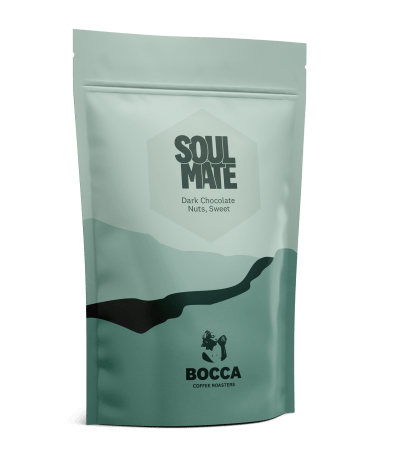Koffiebonen Bocca Soulmate 250gr
Koffiebonen Bocca Soulmate 250gr
Kan beschikbaarheid voor afhalen niet laden
SOULMATE
DARK CHOCOLATE, NUTS, SWEET
Brew advice espresso
- DOSE DOUBLE ESPRESSO 19 grams
- EXTRACTION TIME 26 seconds
- SHOT WEIGHT 40 grams
Brew advice filter
- DOSE 15 grams
- WATER 250 grams at 96 degrees
- PROCEDURE 30 seconds bloom with 50 grams of water, fill up with water to 250 grams
- TOTAL EXTRACTION TIME 2.30 minutes
Heritage
- COUNTRY Brazil
- REGION Sul de Minas
- FARM Passeio
- VARIETY Yellow Catuai, Acaia, Mundo Novo
- PROCESSING METHOD Natural
- ALTITUDE 1000 - 1208 Metres
- CERTIFICATE Conventional
FAZENDA PASSEIO, BRAZIL
We’re thrilled to work with Adolfo Henrique Vieira Ferreira, the owner of Fazenda Passeio. We visited his farm in Brazil several times and only have positive things to say about it “Adolfo is by far the most passionate Brazilian farmer we’ve ever met. He’s also president of the Brazilian part of the Specialty Coffee Association and he’s very keen on helping other farmers teaching new techniques and cultivate varietals. Furthermore, Passeio is extremely beautiful and produces some stunning Brazilian coffees!”.
CARE FOR COFFEE, CARE FOR PEOPLE
The farm is located in the southern part of Minais Gerais, Brazil, where an abundance of specialty coffees is grown. Owner Adolfo is a real example for others in the Brazilian specialty coffee industry: he puts his heart and soul into his work and is fully committed to obtain the highest quality. He is very careful with the use of pesticides on his farm, in order to protect the local ecosystem and abides by all protection laws in the country. In comparison to other Brazilian farms, Fazenda Passeio is relatively small and whereas machine plucking is the standard in Brazil, all the coffee at Passeio is picked by hand and by the use of hand machines.
The Vieira Ferreira family has been producing coffee in the region for over three generations. They own both the Fazenda Passeio and the neighbouring Fazenda Lagoa. In the 1970s, they suffered from an outburst of leaf rust. They have replanted the farm with varieties that are less susceptible to coffee plant diseases. They do their absolute best to improve and increase productivity with respect to the environment and the local workforce, which is a large part of the operation. In everything they do, they emphasize on social improvement: all of the local workers receive social support, such as schooling for their children, workforce training, and environmental education.
WHY NOT ORGANIC BRAZIL?
In contrast to previous coffees in Soulmate, Fazenda Passeio is not organically certified. Organic Brazilian coffee is not always better than the conventional Brazilian coffee. This has several reasons:
1) For organic production more land is needed. Rainforest destruction is already an urgent topic, but next to that, more land means more electricity, water and labor. All of this is not supportive for the environment.
2) Further, the organic pesticides that are being used are not always better for the environment and health then how conventional coffee is produced.
3) Due to Brazilian regulations for organic production and fraud, there are hardly any farms left that really produce according to the rules. By doing tests on green coffee ourselves, we found out that not all organically certified coffees were really organic: several times we found pesticides on the beans.
The amount of high-quality Brazilian organic coffee is extremely low so unfortunately, we were not able to find a coffee we feel is worth buying. Therefore, we decided to change Soulmate into this delicious conventional Brazil.
Share


